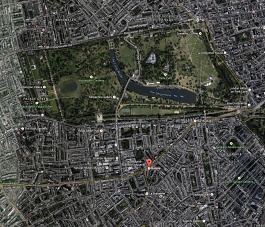
The Observer: Is London becoming a city of ghosts?
 |
Racine was a restaurant that everyone in West London desired: its reviews were excellent, the cuisine outstanding, and its location on Brompton Road enviable. For twelve years, it served its discerning customers food that met high French standards and seemed to be a business that would last a hundred years.
But two weeks ago, owner Henry Harris announced that the last rabbit had been cooked at Racine and that the restaurant was closing. What happened?
"It was inevitable. The place could not be sustained," Harris said. "The increase in rent was a catalyst, but the main cause became the declining number of residents in an area that should be densely populated. My original clients, who were between 50 and 60 years old when we opened, are now somewhat older. After the recession, some of them could no longer afford to eat in restaurants as often. Others realized the value of their homes and decided to sell them. New owners do not live here. About 20% of the apartments are empty - that means one-fifth of my potential clientele. It makes a big difference. It's now easier to park in the neighborhood. This was previously unthinkable in Knightsbridge."
Racine is the latest victim of a phenomenon that some call "London is switched off." Absent owners push property prices high without contributing to the local economy. When Racine opened in 2002, the average price of a home in Knightsbridge was £745,000 (CZK 27.6 million). Now it's £3.4 million (CZK 126 million). There are about 22,000 empty properties in London. This is partially a result of the importance of the British capital, which writer William Gibson called "a natural home for what can be somewhat dodgy capital flight." As the story of Racine illustrates, some businesses feel the consequences.
The absence of residents is characteristic of London's prestigious area around Harrods department store (although this phenomenon can also be found elsewhere, such as in Highgate). A survey conducted last year by Empty Homes found that the number of empty properties in Kensington and Chelsea had increased by 40%. It was the only area where such an increase occurred. Other boroughs, where the number of empty properties also rose, were poorer areas in North and Northeast London. In a city where property ownership is becoming increasingly inaccessible, the idea of empty expensive homes is scandalous, and politicians are beginning to act.
Tessa Jowell, who hopes to become the Labour candidate for mayor in the next election, called empty homes a "scandal" in The Independent and promised repressive economic measures. "In today's London, hundreds of thousands of people live either in temporary accommodations, on waiting lists for social housing, or are years away from saving enough to buy their first home. On the other hand, there are very wealthy individuals who buy London homes more as gold ingots than as places to live."
The property hunt has other side effects. Some long-term residents who now live in deserted areas have found themselves in a closed circle. Property prices have driven businesses out of their offices, taking with them the people who used to spend money on lunches.
"We had customers who worked nearby in banking and investment firms and who treated themselves to a nice lunch once a week," Harris says. "But they are gone now. They moved a bit further away to King's Road, where they can get an office for a fraction of the price. I know one architect who moved to Holborn. It wouldn't occur to me that it would be cheaper in the center. Lunch revenues are now half of what they were five years ago. A friend says it feels like a ghost town here."
There is plenty of indirect evidence of empty homes. The Empty Houses agency used data on long-term absenteeism from the city council, but this is not the only type of property use affecting the local economy. What about an apartment that people use three days a week or a house that is occupied only for three months when hard winter hits in Moscow?
"Residents in this part of the city have always been foreigners who were here for a short time. This has created time gaps between tenants. In recent years, the property market has been very active, and homes for sale are often unoccupied. Some spaces may also belong to people who primarily live in the countryside," said Neal Hudson, an analyst at Savills real estate agency.
Other entrepreneurs in the area have noted changing patterns of seasonal demand. Tibor Ivanics is the director at the Robert Frew antiquarian bookshop, a few doors down from the Racine restaurant, which relied especially on a steady clientele. "In the summer, when the weather isn't so warm, there are mainly many Arabs here in the evenings," he says. "Some of them even have their Ferraris sent here, so they cannot stay in hotels. Before them, it was the French."
People think that businesses in West London are bustling from morning to evening, but the streets here are not always lined with gold. Not for restaurant owners, it seems. However, for property owners, the streets still shine, even when no one is home.
The English translation is powered by AI tool. Switch to Czech to view the original text source.









